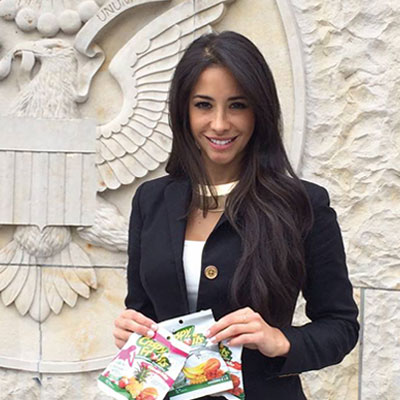Meet the New Jersey Entrepreneur Helping 90,000 Children Eat Healthier
Date: July 5, 2017
Jimena Florez started her first business at the age of 8, selling flavored Jell-O powders in straws to her Bogotá classmates. Now she’s the founder of Chaak Healthy Snacks, a socially conscious business that brings nutritional snacks to public school children in Colombia and the United States. Florez employs about 13 people in Colombia and nine in the United States. “We’re a small company, and we’re working with government projects to benefit around 90,000 children in both countries,” she says.
 Florez’s father served as the governor of Casanare, a state in east-central Colombia, and she received her bachelor’s degree in Australia. She learned about environmentally friendly business practices, and returned home to convince the Colombian Ministry of Education to launch a social-enterprise project to teach sustainable agriculture methods to cacao farmers. Florez used the farmers’ produce to create freeze-dried fruit snacks, which became a hit in cities. The project took off, and 6,000 farmers are now enrolled.
Florez’s father served as the governor of Casanare, a state in east-central Colombia, and she received her bachelor’s degree in Australia. She learned about environmentally friendly business practices, and returned home to convince the Colombian Ministry of Education to launch a social-enterprise project to teach sustainable agriculture methods to cacao farmers. Florez used the farmers’ produce to create freeze-dried fruit snacks, which became a hit in cities. The project took off, and 6,000 farmers are now enrolled.
It was fascinating as a social entrepreneur to be in a location where I could do so many things to improve people’s lives.
This success won Florez a spot in the Women’s Entrepreneurship in the Americas (WEAmericas) initiative, a U.S. State Department program that brings Latin American women to the United States. Florez was placed with an incubator, the Rutgers Food Innovation Center, where she launched a U.S. branch of her company. Her goal: Give hundreds of thousands of public school children her snacks for free and track health outcomes, proving the benefits — and cost savings to health insurers — of healthy food. “It was fascinating as a social entrepreneur to be in a location where I could do so many things to improve people’s lives,” Florez says of her two years in New Jersey. A pilot project is now underway in Newark, where some 5,000 schoolchildren receive Florez’s low-sugar, gluten-free brownies and muesli. She is planning to launch programs on a larger scale in other New Jersey districts and in Florida.
In 2015, after Florez met President Barack Obama at a global entrepreneurship event, the president publicly praised her, saying her work would “empower people in ways that empower societies and ultimately empower the world.” The recognition helped Florez secure an O-1 visa, a temporary work visa for individuals with proven extraordinary ability. Without the O-1 visa, however, which is difficult to obtain, it’s unlikely Florez could have launched her business in America at all. The United States lacks a start-up visa. As a result, many promising foreign-born entrepreneurs either abandon their business plan altogether or move to one of a growing number of countries with policies designed to attract and retain foreign talent.
“One of the things you want when you’re creating a business is to have stability,” says Florez, who wishes the U.S. government would establish a visa for entrepreneurs. In January 2017, the Department of Homeland Security finalized a regulatory measure that would give more foreign entrepreneurs a chance to grow their firms in the United States. But that rule has since been delayed and appears on the way to being rescinded. “I’ve always been very confident, because I know I’m doing something great for the country, but if things had been like this in 2015, it’d have been difficult for me to make the choice.”
